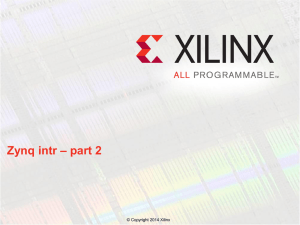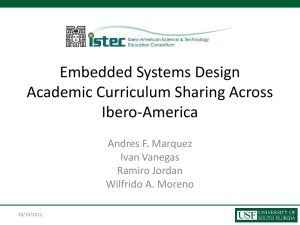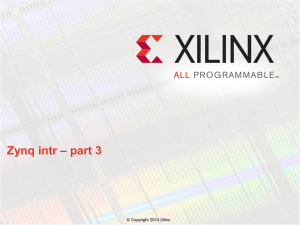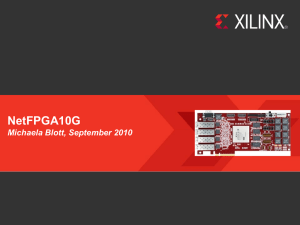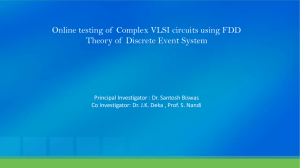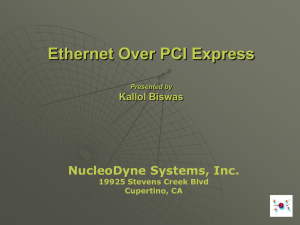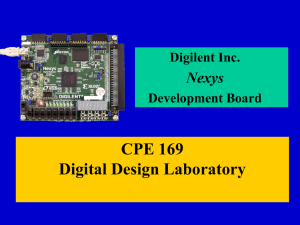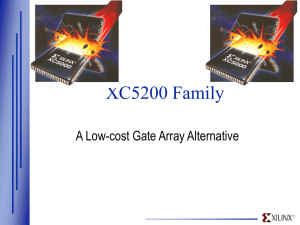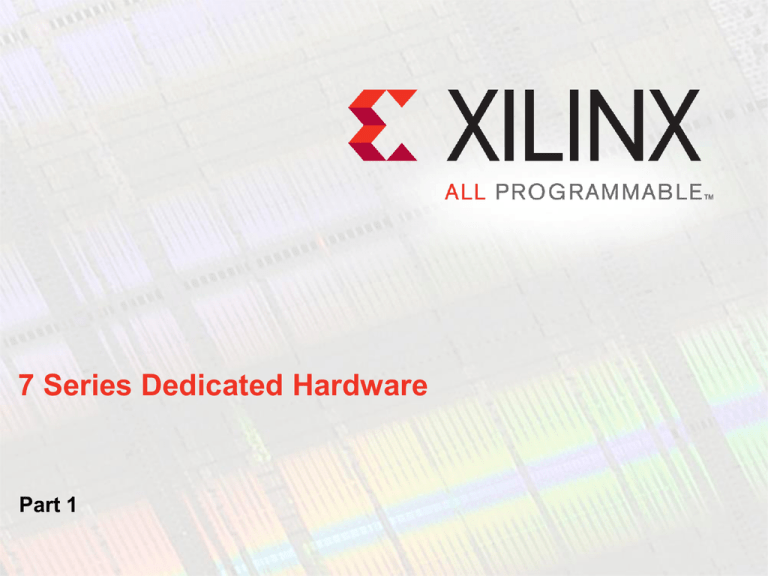
7 Series Dedicated Hardware
Part 1
Objectives
After completing this module, you will be able to:
Describe the dedicated hardware IP that is included with the 7
series FPGAs
Lessons
Serial Gigabit Transceivers
PCI Express Technology Interface
XADC
Summary
Need for Higher Bandwidth
Modern systems require more bandwidth
–
–
–
–
Chip-to chip on the pc-board
Card-to-card
Wiring between boxes
Long distance transmission over fiber optics
Parallel I/O reaches a speed limit
– < 1.5 GHz for single-ended pins
– < 2.0 GHz for LVDS differential pin-pairs
– Standards are getting faster
Wide parallel connections pose problems
–
–
–
–
Use too much space and power
Unavoidable skew between data lanes
Unavoidable skew between clock and data
Crosstalk and other signal integrity issues
Next-Generation Serial Connectivity
HT
XT
28 Gbps
GTZ
GTH
13.1+ Gbps
12.5 Gbps
11.18 Gbps
GTH
GTX
GTX
6.6 Gbps
3.75 Gbps
3.125 Gbps
GTP
GTP
GTX
GTX
GTH
Multi-Gigabit Transceiver
Different families have different MGT devices
– Artix™-7 family: GTP
– Kintex™-7/Virtex®-7 family: GTX
– Virtex-7 XT family: Mixture of GTX and GTH
– Virtex-7 HT family: Mixture of GTH and GTZ
Artix GTP
Speed
Grade
Kintex
GTX
Virtex
GTX
Virtex
GTH
Virtex
GTZ
min
max
min
max
max
(FF)
min
max
min
max
min
max
1LC/I
0.612
3.125
0.612
5.0
6.6
0.612
6.6
0.612
10.3125
N/A
N/A
1C/I
0.612
3.125
0.612
5.0
6.6
0.612
6.6
0.612
10.3125
TBD
TBD
2C/I
0.612
3.75
0.612
6.6
10.3125
0.612
10.3125
0.612
13.1
28.05
28.05
3C
N/A
N/A
0.612
6.6
12.5
0.612
12.5
0.612
13.1
28.05
28.05
Transceiver Quad Clocking
Transceivers in Quads (4 per
block)
nclk<1:0>
PLL (Ring)
TX
RX
– 1 or 2 columns of transceivers
Two types of PLLs
– LC Tank PLL (QPLL)
PLL (Ring)
TX
RX
Common
PLL (LC)
refclk<1:0>
• Highest performance
• LC can operate at 1/2, 1/4 and 1/8
rate
• One per transceiver Quad
– Ring Oscillator PLL (CPLL)
PLL (Ring)
TX
RX
PLL (Ring)
TX
RX
sclk<1:0>
• Wider range of frequencies
• One per transceiver
Flexibility
– Each TX and RX can choose from
its local ring or the common LC
Tank
• Selection can be done
independently for RX and TX
Gigabit Transceivers Overview
Tx
2
PMA PCS
Rx
2
PMA
FPGA
Fabric
Interface
PCS
Dedicated parallel-to-serial transmitter and serial-to-parallel
receiver
– Unidirectional, differential bit-serial data I/O
– Integrated PLL-based Clock and Data Recovery (CDR)
Parallel interface to the FPGA internal fabric
– Width varies by family, protocol, and line rate from 8 to 40 bits
Serial interface to the printed circuit board (differential signaling)
– Differential Current Mode Logic (CML)
– Two traces for the transmitter and two traces for the receiver; removes commonmode noise
Transmitter Overview – PCS
2
Tx
TX
TX
CML OOB PreDriver
&
emp
PCI
PISO
Polarity
Control
Phase
Adjust
FIFO
8B/10B
Decoder
TX
Clock
TX
Gearbox
Tx- PMA Tx- PCS
PRBS
Generator
TX PIPE Control
Physical Coding Sub-layer (PCS)
–
–
–
–
Wide data widths for connection to FPGA fabric
Built-in 8b/10b encoding
Gearbox for 64b/66b and 64b/67b encoding
Pattern generator for testing link integrity
FPGA
TX
Interface
Transmitter Overview – PMA
Tx
2
TX
TX
CML OOB PreDriver
&
emp
PCI
PISO
Polarity
Control
Phase
Adjust
FIFO
8B/10B
Decoder
TX
Clock
TX
Gearbox
Tx- PMA Tx- PCS
PRBS
Generator
FPGA
TX
Interface
TX PIPE Control
Physical Media Attachment (PMA)
– Parallel to serial converter
– Current Mode Logic (CML) differential drivers
• Programmable output level
To compensate for external signal attenuation
• Programmable pre-emphasis
To compensate for unavoidable external low-pass attenuation
– Special signaling required for PCIe® and SATA technologies
Receiver Overview – PMA
2
EQ D
F
E
CDR
SIPO
OOB
Rx
Oversampling
RX
Polarity
Comma
Detect
And
Align
10B/8B
Decoder
Elastic
Buffer
RX
Clock
RX
Gearbox
FPGA
RX
Interface
Loss of Sync
PRBS
Check
RX- PMA
RX Status Control
RX- PCS
PMA
– Differential receiver inputs
• Decision Feedback Equalization (DFE) or Linear Equalization (LPM) to compensate
for board effects
– Clock Data Recovery (CDR)
– Detection of OOB signaling and beaconing
– Serial-to-Parallel conversion
Receiver Overview – PCS
EQ D
F
E
2
CDR
SIPO
OOB
Rx
Oversampling
RX
Polarity
Comma
Detect
And
Align
10B/8B
Decoder
Elastic
Buffer
RX
Clock
RX
Gearbox
FPGA
RX
Interface
Loss of Sync
PRBS
Check
RX- PMA
RX Status Control
RX- PCS
PCS
–
–
–
–
–
Performs comma detection and alignment for framing
Performs 8b/10b decoding
Elastic buffer for matching the rate to the local clock and channel bonding
Gearbox for supporting 64b/66b and 64b/67b decoding
Pattern checker for testing link integrity
7 Series Transceiver Architecture
Major Supported Protocols
Market
Protocol
GTP
GTX
GTX
GTH
General
PCI Express
Gen1
Gen 1, 2, 3
Gen 1, 2, 3
Gen 1, 2, 3
Wired
Ethernet
1GE, 2.5GE,
XAUI
1GE, 2.5GE, XAUI, RXAUI,
10GBase-R, 10G-KR,
40GE, 100GE
1GE, 2.5GE, XAUI, RXAUI,
10GBase-R, 10G-KR,
40GE, 100GE
1GE, 2.5GE, XAUI, RXAUI,
10GBase-R, 10G-KR,
40GE, 100GE
SONET/OTU
OC-3/12
OC-3/12/48/192, OTU1
OC-3/12/48/192, OTU1
OC-3/12/48/192,
OTU1/2/3/4
Interlaken
<= 3.75G
<=6.5G, 12.5G
<=6.5G, 12.5G
<=6.5G, 10.3125G, 12.5G
Custom CEI
Backplane
<= 3.75G
<=6.5G, EQ support for
faster
<=6.5G, EQ support for
faster
<= 6.5G, CEI-11LR
TBD
BPON, GPON, GEPON,
10GEPON, 10GGPON (TX)
BPON, GPON, GEPON,
10GEPON, 10GGPON (TX)
BPON, GPON, GEPON,
10GEPON, 10GGPON*
0.614, 1.2, 2.4,
3.0
0.614, 1.2, 2.4, 3.0, 4.9,
6.14, 9.8
0.614, 1.2, 2.4, 3.0, 4.9,
6.14, 9.8
0.614, 1.2, 2.4, 3.0, 4.9,
6.14, 9.8, 12
Gen1
Gen1, 2
Gen1, 2
Gen1, 2
SD/HD/3GSDI
SD/HD/3G-SDI
SD/HD/3G-SDI
SD/HD/3G/10G-SDI
Yes
Yes
Yes
Yes
x
4.8, 6.4, 8.0*, 9.6*
4.8, 6.4, 8.0*, 9.6*
4.8, 6.4, 8.0*, 9.6*
Fiber Chan.
1G, 2G
1G, 2G, 4G, 8G
1G, 2G, 4G, 8G
1G, 2G, 4G, 8G, 10G
SATA/SAS
1.5G, 3G
1.5G, 3G (pending 6G)
1.5G, 3G (pending 6G)
1.5G, 3G, (pending 6G)
Up to 3.75G
Up to 12.5G
Up to 12.5G
Up to 13.1G
PON
Wireless
CPRI/OBSAI
Serial Rapid IO
Audio Video
SDI
Display Port
Other
QPI
Aurora
Power Reduction Options
nclk<1:0>
PLL (Ring)
TX
RX
Flexible clocking options
PLL (Ring)
– Use only the QPLL for the lowest power consumption
– Use only the CPLLs for more flexibility
– Use both for maximum flexibility
TX
RX
Common
PLL (LC)
refclk<1:0>
PLL (Ring)
Low Power Mode (LPM) receive mode
– Uses lower power linear equalization rather than high power DFE
– Ideal for short chip-to-chip links
TX
RX
PLL (Ring)
Adjust TX CML swing for lower power
TX
RX
FPGA Fabric
sclk<1:0>
Hard
PCS
Logic
TX
Driver
PISO
SIPO
RX
CDR
RX
DFE
X
RX
RX
Linear EQ DiffAmp
X
RX
Low Power
Linear EQ
Serial
Channel
Transceiver Wizard Overview
The Transceiver Wizard simplifies transceiver configuration for common protocols
– Ease of use, shorter design time
Getting Started Guide available
Designing with Multi-Gigabit Serial I/O course available
Transceiver Wizard
Instantiates transceivers (including HDL wrapper)
Steps through the configuration parameters
Protocol-specific templates are provided for common protocols
ChipScope Pro Tool + IBERT
IBERT Console – DEV:1 MyDevice1 (XC5VLX50T) UNIT:0 MyIBERT1
MGT/BERT Settings
MGT118_0
DRP Settings
MGT118_1
Port Settings
MGT120_0
Sweep Test
MGT120_1
Set Sweep Params to Current MGT Values
Clear All
Log File Settings
Parameter Settings
Parameter Name
Start Value
TX Diff Swing
End Value
# of Values
800 mV
1100 mV
3
TX Pre-Emphasis
0%
12%
4
RX Eq
Off
Off
1
TXRX_INVERT
000
111
8
PMA_RX_CFG
9F0080
9F008F
16
47
52
1
RX Sampling Point
Add/Remove Ports/Attribute
Total Iterations: 1536
Current Iteration: 1
Time Per Iteration (s)
1
Can move sampling point within the eye
opening horizontally
Can measure jitter margin vs. bit error rate
for a particular channel and equalization
setting
Can sweep equalization settings to find
optimal setting
Allows easy channel margin analysis
Status/Results
Start
Pause
Reset
Plot
Plot Sweep Test
TX Diff Output Swing = 800 mV (Port TXDIFFCTRL0[2:0] = 000, Port TXBUFDIFFCTRL0[2:0] = 000)
TX Pre-Emphasis = 0% (Port TXPREEMPHASIS0[2:0] = 000)
RX EQ Enable = Off (Port RXEEQB0 = 1)
TXRX_INVERT = 000
PMA_RX_CFG = 9F0080
10e-1
BER
Eye Sweep (ps)
RX Sampling Point
Bit
Error
Rate
10e-5
10e-10
Legend
Choose Curves to Plot
1: 800mv, 0%, OFF, 9F0080
2: 800mv, 0%, OFF, 9F0081
2: 800mv, 0%, OFF, 9F0082
Ideal Sampler Position
Lessons
Serial Gigabit Transceivers
PCI Express Technology Interface
XADC
Summary
Summary
By fully utilizing your dedicated hardware, you can save
substantial FPGA resources and improve system speed
Almost all 7 series FPGAs provide high-speed serial transceivers
– Type and number vary by family; only the smallest Artix-7 devices have
none
– All versions support a variety of protocols
Where Can I Learn More?
User Guides
– 7 Series FPGAs GTX Transceivers User Guide, UG596
• Describes the GTX transceivers in the Kintex-7 FPGAs
Xilinx Education Services courses
– www.xilinx.com/training
• Designing with the 7 Series Families course
• Xilinx tools and architecture courses
• Hardware description language courses
• Basic FPGA architecture, Basic HDL Coding Techniques, and other Free
videos!
Trademark Information
Xilinx is disclosing this Document and Intellectual Property (hereinafter “the Design”) to you for use in the development of designs to operate on,
or interface with Xilinx FPGAs. Except as stated herein, none of the Design may be copied, reproduced, distributed, republished, downloaded,
displayed, posted, or transmitted in any form or by any means including, but not limited to, electronic, mechanical, photocopying, recording, or
otherwise, without the prior written consent of Xilinx. Any unauthorized use of the Design may violate copyright laws, trademark laws, the laws of
privacy and publicity, and communications regulations and statutes.
Xilinx does not assume any liability arising out of the application or use of the Design; nor does Xilinx convey any license under its patents,
copyrights, or any rights of others. You are responsible for obtaining any rights you may require for your use or implementation of the Design.
Xilinx reserves the right to make changes, at any time, to the Design as deemed desirable in the sole discretion of Xilinx. Xilinx assumes no
obligation to correct any errors contained herein or to advise you of any correction if such be made. Xilinx will not assume any liability for the
accuracy or correctness of any engineering or technical support or assistance provided to you in connection with the Design.
THE DESIGN IS PROVIDED “AS IS" WITH ALL FAULTS, AND THE ENTIRE RISK AS TO ITS FUNCTION AND IMPLEMENTATION IS WITH
YOU. YOU ACKNOWLEDGE AND AGREE THAT YOU HAVE NOT RELIED ON ANY ORAL OR WRITTEN INFORMATION OR ADVICE,
WHETHER GIVEN BY XILINX, OR ITS AGENTS OR EMPLOYEES. XILINX MAKES NO OTHER WARRANTIES, WHETHER EXPRESS,
IMPLIED, OR STATUTORY, REGARDING THE DESIGN, INCLUDING ANY WARRANTIES OF MERCHANTABILITY, FITNESS FOR A
PARTICULAR PURPOSE, TITLE, AND NONINFRINGEMENT OF THIRD-PARTY RIGHTS.
IN NO EVENT WILL XILINX BE LIABLE FOR ANY CONSEQUENTIAL, INDIRECT, EXEMPLARY, SPECIAL, OR INCIDENTAL DAMAGES,
INCLUDING ANY LOST DATA AND LOST PROFITS, ARISING FROM OR RELATING TO YOUR USE OF THE DESIGN, EVEN IF YOU HAVE
BEEN ADVISED OF THE POSSIBILITY OF SUCH DAMAGES. THE TOTAL CUMULATIVE LIABILITY OF XILINX IN CONNECTION WITH
YOUR USE OF THE DESIGN, WHETHER IN CONTRACT OR TORT OR OTHERWISE, WILL IN NO EVENT EXCEED THE AMOUNT OF
FEES PAID BY YOU TO XILINX HEREUNDER FOR USE OF THE DESIGN. YOU ACKNOWLEDGE THAT THE FEES, IF ANY, REFLECT
THE ALLOCATION OF RISK SET FORTH IN THIS AGREEMENT AND THAT XILINX WOULD NOT MAKE AVAILABLE THE DESIGN TO YOU
WITHOUT THESE LIMITATIONS OF LIABILITY.
The Design is not designed or intended for use in the development of on-line control equipment in hazardous environments requiring fail-safe
controls, such as in the operation of nuclear facilities, aircraft navigation or communications systems, air traffic control, life support, or weapons
systems (“High-Risk Applications”). Xilinx specifically disclaims any express or implied warranties of fitness for such High-Risk Applications. You
represent that use of the Design in such High-Risk Applications is fully at your risk.
© 2012 Xilinx, Inc. All rights reserved. XILINX, the Xilinx logo, and other designated brands included herein are trademarks of Xilinx, Inc. All
other trademarks are the property of their respective owners.
7 Series Dedicated Hardware
Part 2
Objectives
After completing this module, you will be able to:
Describe the dedicated hardware IP that is included with the 7
series FPGAs
Lessons
Serial Gigabit Transceivers
PCI Express Technology Interface
XADC
Summary
PCI Express Technology Success
PCI Express® technology is now the dominant serial I/O
– Broad market adoption, not just
personal computers
– Full PHY/protocol compliance
– Seamless interoperability between
ASSPs/ASICs/FPGAs
Scalable bandwidth
300
Systems (Million)
Plug-and-play capability removes
technical hurdles
350
250
200
150
100
50
0
2004
– Gen1 (2.5Gbps), Gen2, (5.0Gbps), Gen3 (8Gbps)
– Multiple lane configurations (x1, x2, x4, x8, x16)
2005
2006
2007
2008
2009
PCI Express System Shipments
7 Series FPGA PCI Express Solutions
Aggregate
Data Rate
Soft IP
Integrated Block
T / XT Devices
X8 Gen3
Root &
Endpoint
Soft-IP
X4 Gen1 Root
& Endpoint
Hard-IP
X8 Gen2
Root &
Endpoint
Hard-IP
T Devices
X8 Gen3
Root &
Endpoint
Soft-IP
(T devices)
X8 Gen3
Root &
Endpoint
Hard-IP
(XT devices)
X8 Gen2
Root &
Endpoint
Hard-IP
Hard PCI Express block in Every 7 Series Family –
Unified Architecture for Scalable Bandwidth
16 GB/s
8 GB/s
2 GB/s
7 Series Gen2 Integrated Block
Features
–
–
–
–
–
–
–
Compliant to PCIe revision 2.1
Endpoint & Root Port
AXI user interface
<100ms FPGA configuration over PCI Express
Easy migration from previous generation
End-to-end CRC
Advanced Error Reporting
GTX Transceivers
PCI Express Block
Transaction
Layer
Data
Link
Layer
Physical
Layer
Wrappers
– Multi-Function
– Single-Root I/O Virtualization
Configurations
– Lane Widths: x1-8
– Data Rates: Gen1 & Gen2 (2.5/5.0 Gbps)
– Scales with device, GT and fabric speed
Improved Feature Set
Configuration module
Block RAM
7 Series FPGAs
7 Series Gen3 Solutions
Soft
Hard
Soft IP
– Kintex-7 and Virtex-7 families
– Supported in -2 & -3 speed grades
– Xilinx supplied Gen3 PCS/PMA
• GTX transceivers
• PIPE 3.0
Transaction
Layer
AXI
Data
Link
Layer
Alliance Partner IP
– Alliance partner soft IP for Gen3
PCS
PMA
PIPE 3.0
Kintex-7 and Virtex-7 FPGAs
• Data Link layer
• Transaction layer
Hard IP
– Virtex-7 XT family
– Integrated block for PCIe Gen3
– Up to 8 lanes Gen3
Transaction
Layer
AXI
Data
Link
Layer
PCS
PCS
PMA
Integrated IP
Virtex-7 XT FPGAs
7 Series PCIe AXI4 Interfaces
Designed for Different Personas
PCIe Wrapper AXI-ST Basic
AXI4 – Streaming Basic
AXI-ST TX
– Easy migration from Local Link
– Maximum control
Requestor I/F
Requestor Write
IW AXI-S Data
Requestor Read
IR AXI-S Data
Requestor Completion
IC AXI-S Data
– New designs
– Minimizes design work by
including common functions
Completer Write
Completer I/F
– Enables high-performance
– Memory Mapped Users
– Processor/EDK Users
– Migration from PLB46
Stream
Combiner
Splitter
PCIe
TW AXI-S
Data
TR AXI-S
DeMUXing
Data
AXI-MM for PCIe
Write
RequestorI/F
Address Write
B
Read
IW AXI-S Data
Requestor I/F
Memory Map
IR AXI-S Data
IC AXI-S Data
MUXing
Address Read
Write
Completer I/F
Address Write
Extensive PCI Express Coverage
for Different User Needs
PCIe
Block
Completer Read
Completer Completion
AXI4 – Memory Mapped (MM)
PCIe
AXI-ST Enhanced for PCIe
– Maximum performance
AXI4 – Streaming Enhanced
PCIe Block
AXI-ST RX
B
Read
Address Read
Completer I/F
Memory Map
TW AXI-S
Data
TR AXI-S
DeMUXing
Data
Stream
Combiner
Splitter
PCIe
Block
PCIe
CORE Generator Interface Simplifies Design
Tasks
Configures the PCIe Integrated Block
– Lane width*, link speed*, BAR settings,
buffer configurations, interrupts
Configures the GTX transceivers for
specific PCIe requirements
– Electrical Idle, OOB signaling, signal
swing, de-emphasis, channel bonding*,
data rate selection*
Connects PCIe, block RAM,
GTX/GTP
– Automatically inserts pipeline registers
between the PCIe block and block RAM
if necessary
CORE Generator eliminates the complexity
Lessons
Serial Gigabit Transceivers
PCI Express Technology Interface
XADC
Summary
XADC Block Diagram
17 External
Analog Inputs
Analog
Digital
On-Chip
Sensors
Mux
ADC
ADC Results
Status
Registers
Control
Registers
ADC 2
Define XADC
Operation
Initialise with
Attributes
DRP
JTAG
Arbitrator
On-Chip Sensors
Supplies ±1%
Temperature ±4°C
2x
1212
Bits
Bits
11MSPS
MS/s
Interconnect
Dynamic Reconfiguration
Port Interface
High Quality ADCs
High resolution Analog to Digital Converters (ADCs)
– Factory tested and specified 12-bit accuracy with 1V input range
• 16-bit resolution conversion
• Built in digital gain and offset correction / calibration
Fast sampling
– Conversion time of 1 us with support for simultaneous sampling
– Flexible timing modes (self and externally triggered sampling modes)
– Separate track/hold amplifier for each ADC ensures maximum throughput
using multiplexed analog input channels
Flexible analog inputs
– Differential analog inputs with high common mode noise rejection
– Support for unipolar, bipolar, and true differential input signal types
Available in all 7 series devices
Other Features
Internal and external multiplexing and sampling
– Can sample internal power supplies and temperature
– Multiplexes internal sources and 17 external analog inputs
– Can control an external analog multiplexer to reduce pin count
Flexible triggering
– Conversion data is stored in internal status registers
– Internal control registers control source selection, sampling, and alarms
– Registers can be accessed internally via Dynamic Reconfiguration Port
(DRP)
– Register can be accessed via JTAG
• Available on power up, before configuration
• Accessible through ChipScope™ Pro tool GUI
Operates over a wide temperature range (–40°C to +125°C)
Lessons
Serial Gigabit Transceivers
PCI Express Technology Interface
XADC
Summary
Summary
By fully utilizing your dedicated hardware, you can save
substantial FPGA resources and improve system speed
Almost all 7 series FPGAs provide high-speed serial transceivers
– Type and number vary by family; only the smallest Artix-7 devices have
none
– All versions support a variety of protocols
Where Can I Learn More?
User Guides
– 7 Series FPGAs GTX Transceivers User Guide, UG596
• Describes the GTX transceivers in the Kintex-7 FPGAs
Xilinx Education Services courses
– www.xilinx.com/training
• Designing with the 7 Series Families course
• Xilinx tools and architecture courses
• Hardware description language courses
• Basic FPGA architecture, Basic HDL Coding Techniques, and other Free
videos!
Trademark Information
Xilinx is disclosing this Document and Intellectual Property (hereinafter “the Design”) to you for use in the development of designs to operate on,
or interface with Xilinx FPGAs. Except as stated herein, none of the Design may be copied, reproduced, distributed, republished, downloaded,
displayed, posted, or transmitted in any form or by any means including, but not limited to, electronic, mechanical, photocopying, recording, or
otherwise, without the prior written consent of Xilinx. Any unauthorized use of the Design may violate copyright laws, trademark laws, the laws of
privacy and publicity, and communications regulations and statutes.
Xilinx does not assume any liability arising out of the application or use of the Design; nor does Xilinx convey any license under its patents,
copyrights, or any rights of others. You are responsible for obtaining any rights you may require for your use or implementation of the Design.
Xilinx reserves the right to make changes, at any time, to the Design as deemed desirable in the sole discretion of Xilinx. Xilinx assumes no
obligation to correct any errors contained herein or to advise you of any correction if such be made. Xilinx will not assume any liability for the
accuracy or correctness of any engineering or technical support or assistance provided to you in connection with the Design.
THE DESIGN IS PROVIDED “AS IS" WITH ALL FAULTS, AND THE ENTIRE RISK AS TO ITS FUNCTION AND IMPLEMENTATION IS WITH
YOU. YOU ACKNOWLEDGE AND AGREE THAT YOU HAVE NOT RELIED ON ANY ORAL OR WRITTEN INFORMATION OR ADVICE,
WHETHER GIVEN BY XILINX, OR ITS AGENTS OR EMPLOYEES. XILINX MAKES NO OTHER WARRANTIES, WHETHER EXPRESS,
IMPLIED, OR STATUTORY, REGARDING THE DESIGN, INCLUDING ANY WARRANTIES OF MERCHANTABILITY, FITNESS FOR A
PARTICULAR PURPOSE, TITLE, AND NONINFRINGEMENT OF THIRD-PARTY RIGHTS.
IN NO EVENT WILL XILINX BE LIABLE FOR ANY CONSEQUENTIAL, INDIRECT, EXEMPLARY, SPECIAL, OR INCIDENTAL DAMAGES,
INCLUDING ANY LOST DATA AND LOST PROFITS, ARISING FROM OR RELATING TO YOUR USE OF THE DESIGN, EVEN IF YOU HAVE
BEEN ADVISED OF THE POSSIBILITY OF SUCH DAMAGES. THE TOTAL CUMULATIVE LIABILITY OF XILINX IN CONNECTION WITH
YOUR USE OF THE DESIGN, WHETHER IN CONTRACT OR TORT OR OTHERWISE, WILL IN NO EVENT EXCEED THE AMOUNT OF
FEES PAID BY YOU TO XILINX HEREUNDER FOR USE OF THE DESIGN. YOU ACKNOWLEDGE THAT THE FEES, IF ANY, REFLECT
THE ALLOCATION OF RISK SET FORTH IN THIS AGREEMENT AND THAT XILINX WOULD NOT MAKE AVAILABLE THE DESIGN TO YOU
WITHOUT THESE LIMITATIONS OF LIABILITY.
The Design is not designed or intended for use in the development of on-line control equipment in hazardous environments requiring fail-safe
controls, such as in the operation of nuclear facilities, aircraft navigation or communications systems, air traffic control, life support, or weapons
systems (“High-Risk Applications”). Xilinx specifically disclaims any express or implied warranties of fitness for such High-Risk Applications. You
represent that use of the Design in such High-Risk Applications is fully at your risk.
© 2012 Xilinx, Inc. All rights reserved. XILINX, the Xilinx logo, and other designated brands included herein are trademarks of Xilinx, Inc. All
other trademarks are the property of their respective owners.


